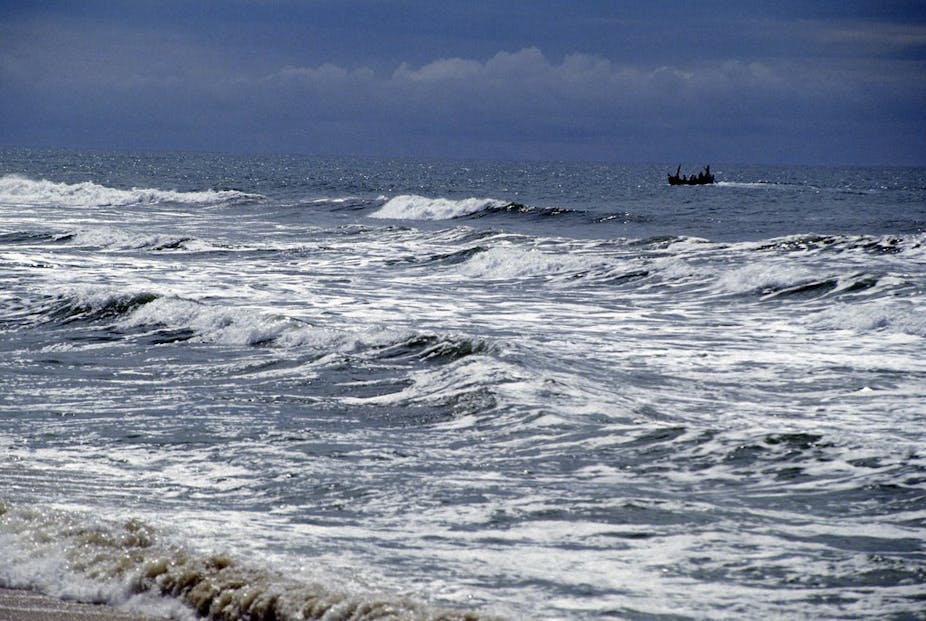Ghana has an abundance of marine resources. They include fisheries, hydrocarbon reserves, inland waterways and ports that are located along important international shipping lanes. These present the country with a wide range of opportunities for ensuring food security, bridging income inequalities, attracting foreign direct investment, increasing domestic productivity, and enhancing trading conditions.
This underscores the imperative to harness and safeguard them wisely.
About 7.5 million people in Ghana live in coastal areas and double that number live about 50km away from the coast. Like many other coastal African countries, Ghana significantly relies on its blue economy for income, employment and food. The oil and gas sector has generated over $4 billion.) in revenue since commercial operations began in 2010. And about 10% of Ghana’s workforce is employed in the fishing sector, which also accounts for 4.5% of the country’s GDP.
In addition, 70% of Ghana’s trade is carried by sea through its ports in Tema and Takoradi. The Port of Tema is the largest container port in West Africa and Ghana.
But Ghana’s coastal areas also faces significant challenges in the form of what are referred to as “blue crimes”. These include ocean dumping, piracy, stowing away, drug and human trafficking, smuggling of arms, blue cyber threats and illegal, unreported and unregulated fishing. Piracy has taken the centre-stage in Ghana and other Gulf of Guinea countries. But the other crimes also have a significant impact on the trade, government revenue and the potential developments that can accrue from the blue economy.
Certainly, Ghana cannot afford the consequences of ignoring its maritime domain. That’s why it’s developed a comprehensive National Integrated Maritime Strategy .
In a recently published paper we analyse the strategy. One thing is certainly clear: it is destined for failure without adequate political will from the highest echelons of government and without the necessary resources (financial, human resource, equipment and technology) to support strategies and actions plans.
A policy is born
The vision of the strategy is to ensure that by 2040, Ghana’s maritime space will be safe and secure with a thriving blue economy that benefits every Ghanaian. It presents an integrated approach towards achieving this vision.
The document outlines six strategic objectives that focus on safety, security, marine environmental protection, blue economy development, capacity building and cooperation. It also provides a framework for implementation and sustainability. This includes calls for the allocation of resources funded from the national budget.
The origins of the strategy can be traced to the work of the Security Governance Initiative. This is an international security initiative signed in 2016 between the US and five partner African countries. They are Ghana, Kenya, Mali, Niger, Nigeria and Tunisia. Its objective is to facilitate the development of expertise on national security issues to assist with key reforms in some sectors.
There was an initial focus on maritime security threats and transnational blue crimes spanning maritime, border and cyber. However, this changed after the settlement of Ghana’s maritime border dispute with Cote d'Ivoire by the International Tribunal of the law of the Sea in 2017. The settlement allowed Ghana to retain ownership of its lucrative offshore oil fields.
With Ghana’s maritime space now exceeding its landscape, there was a need to replace the existing policy with a more expansive framework. Thus the National Integrated Maritime Strategy was born.
Two drivers
The initial drivers of the strategy were both maritime security and blue economy development. Yet at the implementation workshop, some stakeholders were of the view that it seemed to be a maritime security strategy that attempted to integrate other sectors of the blue economy.
When the initial draft was being reviewed by stakeholders, this resulted in heated debates by breakout teams about prioritisation of activities. At the heart of this is the extent to which development-related stakeholders were initially involved. Stakeholder representation is crucial, particularly when there is unavailability or little use of national maritime data.
In Ghana, some stakeholders also argue that the driver for the maritime strategy must be economic in nature and not security focused. This is because safety and security play a cross-sectional role in the marine space. They further argue that economic issues including oil and gas activities, fishing, tourism, port expansion, coastal erosion and flooding due to climate change directly affect livelihoods. Therefore, the stakeholders assert that development should have been the focus and driver of the strategy from the onset. Security strategies could then be developed from threat assessments linked to the economic issues.
Important new tool
Ghana is a relatively young maritime nation. Traditionally, the ocean has been used for fishing but there is now increased multiple use of the marine space. Hence the integrated strategy is crucial to the development, safety and security of the blue economy.
In the regional context, it is an essential linchpin for the Yaounde Code of Conduct Architecture. This was signed in 2013 by 25 countries in the West and Central African region with the aim of assisting the regions in addressing an array of maritime crimes affecting the region.
The progress of Ghana with this policy will be a learning platform for other African countries. For example, South Africa is in the process of addressing its own maritime security interests. Of particular importance is how the process Ghana followed serves as a catalyst to advance and direct the South African endeavour.
As both the process, as well as the eventual strategy each holds its own intrinsic values for success, it is the consultative process Ghana followed and situating the integrated strategy at high political office that serve as good guidance for South Africa.

